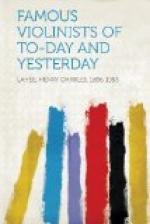In 1839 he again visited England, where his music had become very popular, and during the remainder of his career he repeated his visit several times, many of his works being produced by the various societies.
His life at Cassel was not free from cares and friction, and he was subjected to many indignities and annoyances by the elector. Perhaps his sympathy with the revolutionists of 1848 was the chief cause of these petty persecutions. When Spohr married his second wife, Marianne Pfeiffer, the elector objected, and only gave his reluctant consent when Spohr agreed to waive the right of his wife to a pension. All his proposals were met with opposition. “Tannhaeuser” was produced and well received, but a repetition of the performance was not allowed, and “Lohengrin” was ordered to be withdrawn from rehearsal, for Wagner was one of the revolutionists and was obliged to live in seclusion.
America is indebted to this revolution of 1848 for some excellent musicians, for the Germania Orchestra, an organisation of young revolutionists, sought these shores, and after a prosperous career, begun under great trials and discouragements, the various members settled in different cities and became identified with the musical life of the nation.
In 1851 the elector refused to sign the permit for Spohr’s two months’ leave of absence, to which he was entitled under his contract, and when the musician departed without the permit, a portion of his salary was deducted. In 1857 he was pensioned off, much against his own wish, and in the winter of the same year he had the misfortune to break his arm, an accident which put an end to his violin playing. Nevertheless he conducted his opera “Jessonda” at the fiftieth anniversary of the Prague Conservatorium in the following year, with all his old-time energy. In 1859 he died at Cassel.
Through all his long career Spohr had lived up to the ideal he had conceived in his youth. He was a man of strong individuality, and invariably maintained the dignity of his art with unflinching independence. Even the mistakes that he made, as for instance his criticism of Beethoven, bore the strongest testimony to his manly straightforwardness and sincerity in word and deed. He was a most prolific composer, leaving over two hundred works in all. His violin concertos stand foremost among his works, and are distinguished as much by noble and elevated ideas as by masterly thematic treatment, yet there is a certain monotony of treatment in all, and his style and manner are entirely his own.
As an executant Spohr stands among the greatest of all time. In slow movements he played with a breadth and beauty of tone, and a delicacy and refinement of expression almost unequalled. His hands were of exceptional size and strength, and enabled him to execute the most difficult double stops and stretches with the greatest facility. Even in quick passages he preserved a broad, full tone, and his staccato was brilliant and effective. He disliked the use of the “springing bow,” which came with the modern style of playing.




